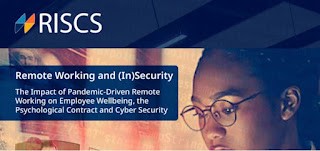My CDT Journey - Dr Andreas Haggman
I came to the CDT almost as the token non-technical person in my cohort. With an academic background in War Studies I thought I was going to occupy a small niche in cyber security separate from computer science and mathematics. I was partially right, but also very wrong.
Sure, my previous knowledge was different from most other students, but instead of working in isolation from more technical colleagues I found that their skills and experiences enriched my own work and in turn I was able to enrich theirs – I hope! Cyber security truly is an interdisciplinary subject and for me the CDT offered an ideal environment to both appreciate and embrace this.
My research journey was unlike anything I could have
envisaged – indeed, I am still not entirely convinced I did a PhD. My thesis
emerged from my summer project investigating cyber wargaming, which had just been
intended as an exploratory foray into something different and fun, but quickly
grew into something much more substantial. For my thesis I ended up producing a
tabletop wargame based on the UK National Cyber Security Strategy (see picture)
intended to provide players with an introduction to key concepts and
terminology in cyber security. Through serendipity and perseverance, the game
got traction with key stakeholders and I then travelled the world deploying the
game to different groups of people to ascertain its pedagogic efficacy. Does
three years of playing board games constitute legitimate research fieldwork?
Apparently so!
Apart from being an immensely engaging thesis that I never
tired of, the work also yielded some insightful results. Most importantly, the
game was successful in enabling players to create learning moments where they
could share knowledge and come away from the game with a greater understanding
of cyber security than they started. Statistically, the groups that performed
best in the game were made up of players from mixed backgrounds (technical,
non-technical, military, civilian) which reinforces the idea that cyber
security is best tackled through interdisciplinary approaches.
In addition to my thesis work I used the opportunities afforded
by the CDT to put my fingers in as many pies as possible. I published articles
and book chapters on diverse topics including Stuxnet, offensive cyber, cyber
deterrence, communications and technology, and cyber defence exercises. Also
counting various magazine articles and blogs my total publications amounted to
some 23 pieces. I attended 53 conferences and spoke at 27 of these. I led the
organisation of the first two inter-CDT workshops with the Oxford CDT, which is
a legacy that carries on today. I spent three months in Canberra on work
placement with Thales Autralia. I also participated with a CDT team in the 2017
Cyber 9/12 student policymaking competition in Geneva, on the back of which I
was invited to help organise a UK version of the event, which I continue to be
affiliated with today as Scenario Development Lead. In sum, I got busy, and the
CDT was a wonderfully supportive environment in which to explore all the
wonders that cyber security has to offer.
Amongst all these things some highlights certainly stand out
as memorable. Being invited to guest lecture at the German Command and Staff
College, with my game, was a an achievement dear to me because it meant both
walking in the footsteps of Carl von Clausewitz – who is the doyen of War
Studies – and taking my game to its spiritual home – the German military
pioneered modern wargaming in the 19th century. I was also invited to write an
article about my research for New
Statesman which I still roll out whenever anyone asks what I
did for my PhD (it is available online for anyone interested).
After all the excitement and adventure of the PhD, gainful
employment had a lot to live up to. After submitting my thesis, I spent a short
stint in the insurance sector trying to bring academic research to bear on
cyber and geopolitical risks. Growing frustrated with this, however, I left for
what is probably my ideal role as a Cyber Security Skills Policy Lead in the
Department for Digital, Culture, Media and Sport (DCMS). In essence this has
taken me full circle from being a product of the National Cyber Security
Strategy to helping write the next iteration of the Strategy, alongside working
on related policy initiatives. Working in the Skills area is particularly
gratifying as it is related to my thesis, and it lets me stay close to the
academic community that has given me so much. If I can affect policies that
enable the cyber security academic community to flourish it will be my way of
giving something back, a small measure of thanks for four fabulous years in the
CDT.


Comments
Post a Comment